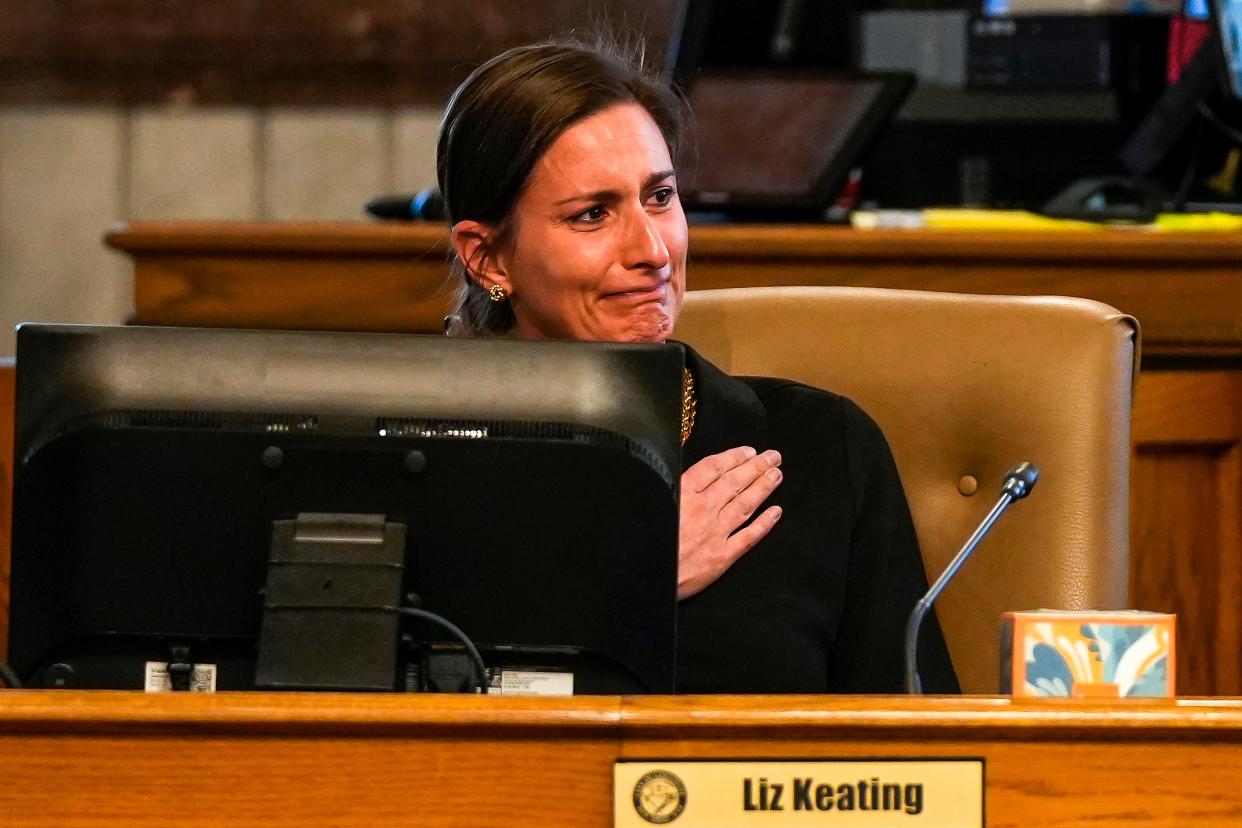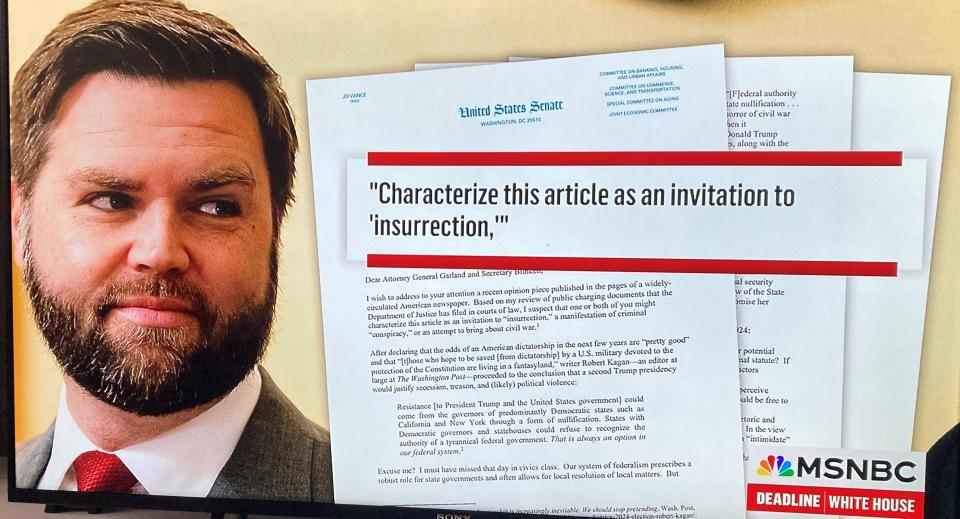Keating's departure leaves Ohio's largest cities without Republicans in office | Opinion

- Oops!Something went wrong.Please try again later.
- Oops!Something went wrong.Please try again later.
And then there were none.
When Liz Keating turns out the lights in her City Hall office for the last time in a couple weeks, Cincinnati will for the first time in modern history have an all-Democratic Party city council. Keating’s defeat in the November elections capped a recent Ohio trend that has left the state’s six largest cities without a Republican on their elected councils.
"That’s bad for democracy," Keating said.
What’s the difference between an 8-1 council and a 9-0 council? While it’s Democrat-controlled government either way, at least the former version always had a voice of dissent and challenge.
"I think it’s just really, really important to have that diversity of thought," Keating said in her office, decorated with her two young children’s artwork and notes. "You need somebody who is asking questions, who is challenging ideas, who has a different perspective and is willing to offer that perspective.
"I think that helps result in better ideas coming forward," she said.
The numbers in the heavily Democratic city were against Keating, who was appointed to council in 2020 and elected in 2021.
Unlike 2021, when there were 35 candidates competing for nine council seats in the aftermath of the arrests of three Democratic council members in separate corruption cases, 2023 found Keating as the only Republican as a disciplined Democratic Party fielded a nine-candidate slate that included eight incumbents.
In 2021, she was elected with 17,497 votes. In November, she tallied 36,789 votes, but that was nearly 4,000 votes behind the ninth-place Democrat.
"We could have spent another million dollars and I don’t think it would have changed anything," she said. "We couldn’t make the numbers work."
Keating, whose late grandfather William J. Keating was a Republican congressman who became publisher of The Enquirer, is not only the last Republican on a large-city Ohio council, she’s also part of a dwindling breed of moderate-to-conservative traditional Republicans in an era dominated by Donald Trump that has seen politics become increasingly polarized.
"I think in this country, from federal, state, and local levels, we desperately need to be able to bring people together again … it doesn’t have to be contentious."
Republicans in Ohio control state government after winning in the state’s rural and suburban areas, but she’d like to see the party focus less on culture wars issues to broaden its appeal for the long term.
"The Republican Party historically has been really good at creating safe neighborhoods for people, being fiscally responsible, in job creation and growth; being able to expand that tax base without raising taxes. I think we need to get back to the basics."
Ohio Republicans clearly haven’t been on the winning side of the abortion issue, after Ohioans defeated a measure aimed at abortion in August with 57% of the vote and then passed an abortion access constitutional amendment in November with 57%.

Keating didn’t talk much about abortion during the campaign, but sees it as a matter of limiting government interference in private lives.
"I am Catholic. I am pro-life personally," she said. "I am also a big believer in limited government and separation of church and state … I don’t think government officials should be making medical decisions for someone else that’s between them and their doctors."
As she leaves government after three years, Keating sees the city facing tough decisions on its budget and needing to offer more affordable housing and child care, and to reduce gun violence.
"Because of the (federal) stimulus dollars there hasn’t been strong fiscal discipline, "she said. "That’s going to start to show when the stimulus dollars run out and then we have a major deficit in front us … so tough decisions are going to have to be made and it’s been a long time since tough decisions have been made."
She in her last month is promoting newly introduced city legislation to mandate quick reporting of lost or stolen firearms and to assess a fee for police costs in processing and storing firearms that were lost through negligence. She’d like to see Republicans in the Statehouse do more.
She hopes Cincinnati will eventually have zoning reforms to facilitate affordable housing.
"We need people to understand that if we want to continue to grow, if we want to be able to expand that tax base and be fiscally healthy, we need to build more housing in places for everybody to live." Providing parents and caregivers with more child-care access is also important to keeping people working and earning in the city, she said.
She will continue promoting an E-Sports Saturdays initiative to get teens involved in an organized way in video gaming. Besides something fun to do with peers, the initiative is aimed at developing computer skills that can lead to scholarships and jobs. Schools, community organizations and libraries are among partners with her and the city manager.
Keating just turned 40 and leaves office with a generally positive image. There are certainly those who see her as a potential candidate for a county, state legislative or even congressional seat.
"I don’t know," she said. "I never saw myself as a politician … always looking for the next job to run for. I have absolutely loved this job … because I have this deep love for the city, working with all the incredible people in the community," she said. "So, I don’t want to close the door."
EXTRA POINTS
Vance riles some national pundits
If Ohio’s Republican U.S. Sen. J.D. Vance was wondering whether liberal national pundits were paying attention to him, now he knows.
Vance, still in his first year in office, stepped into their line of fire with a Dec. 6 open letter to Attorney General Merrick Garland and Secretary of State Anthony Blinken responding to a Washington Post column by scholar-columnist Robert Kagan. Kagan was raising alarm about signs that a second Donald Trump presidency would be dangerously authoritarian. Kagan suggested Democrat-controlled states such as California and New York could resist tyranny, including with "nullification," refusing to recognize Trump’s authority.
Vance said in his letter that Justice Department prosecutors "have embraced several stunningly broad interpretations of federal law in their bid to ensnare President Trump in criminal wrongdoing."

The Yale Law School alumnus wrote: "Based on my review of public charging documents that the Department of Justice has filed in courts of law, I suspect that one or both of you might characterize this article as an invitation to 'insurrection,' a manifestation of criminal 'conspiracy,' or an attempt to bring about civil war."
Besides calling for an investigation into Kagan, Vance suggested reviewing the security clearance of Kagan’s wife, Undersecretary of State Victoria Nuland.
While Vance’s letter at times seemed more satirical than serious, Washington Post columnist Ruth Marcus responded with a column titled: "How an Ohio senator’s stunt proves the Trump dictatorship theory."
"Under ordinary circumstances − that is to say, circumstances in which Trump’s reelection were not a serious possibility − Vance’s missive would be dismissible for what it is: a preening, Trump-toadying stunt. No sane Justice Department would take any action other than tossing Vance’s letter in the trash," Marcus wrote.
Charlie Sykes, in a The Bulwark online column titled "J.D. Vance Walks into a Bar…," wrote that Vance’s efforts to joke about the threats of a Trump 2, such as urging people on the X social media site to take "a chill pill," fall flat with Trump openly discussing using the Justice Department for retribution.
Vance’s letter also got featured for discussion by commentators on the "Deadline White House" show on the MSNBC cable channel.
They’re not fans.
Heated school board race brings big turnout in suburban area
The Forest Hills School District has been one of the Cincinnati area’s most tumultuous over the past two years, after the 2021 election of a school board majority dedicated to opposing critical race theory, a graduate-level study of the impact of systemic racism in the United States.
The board soon passed a "Culture of Kindness" resolution restricting classroom study and discussion on race, sex, sexual orientation, gender identity, religion and socioeconomic class. It’s pending in federal court after some parents and students filed a lawsuit to block it.
The divide has produced some raucous school board meetings, and this fall, it produced big voter turnout numbers: 63.7% overall with two school board races on the ballot compared to 48.3% countywide in Hamilton County. That’s way up from the district’s 39.2% turnout in 2021.
More: Culture warriors suffer defeat in local school board races across Ohio
Data analyst Jeff Hastings, an Anderson Township resident who regularly does statistical breakdowns of elections, found that of the some 26,000 registered voters in the school district that includes Anderson and the Village of Newtown, more than 23,000 voted this fall. Based on which party’s primary the voters participated in most recently, he found only 200 Democratic voters didn’t vote this fall, giving Democrats a turnout of nearly 95%. Republican turnout in the district was 92.2%, according to Hastings’ research.
For voters without a party affiliation, turnout was 53.2%. Hastings said the no-party turnout was significantly higher in the Forest Hills district than countywide, where it was 38.8%. So that indicates independents and others who don’t vote in partisan primaries gave the Democratic-backed candidates an important boost.
Winners Wendy Strickler Biederman and Jason Simmons say they want to get the school board refocused on education, not culture wars, and to make sure all students know that they belong and their voices matter.
As it should be.
Coming attraction
This column will return in two weeks, when we will unveil the winners − and losers − in the third annual Cincinnatus selections for the year’s heroes and zeroes.
Happy Holidays!
Dan Sewell is a regular Opinion contributor. Contact him at his personal email: dsewellrojos@gmail.com.
This article originally appeared on Cincinnati Enquirer: Six largest Ohio cities without a Republican on their elected councils

